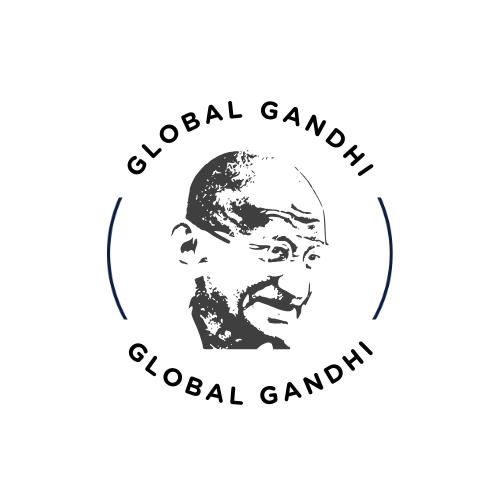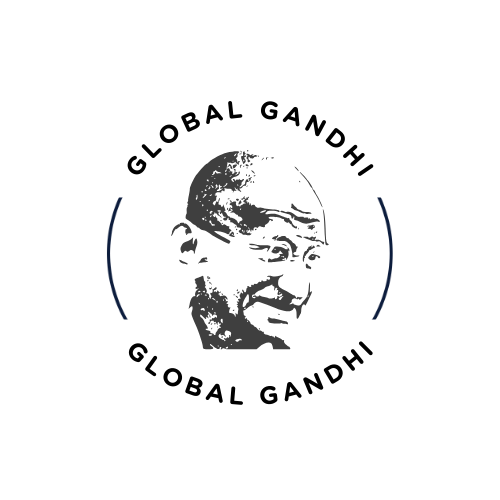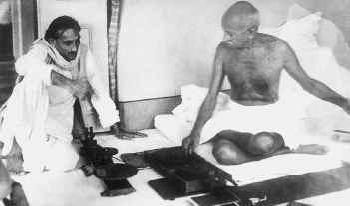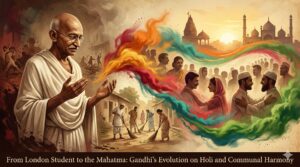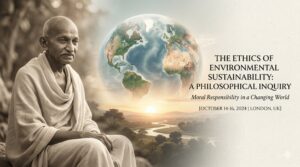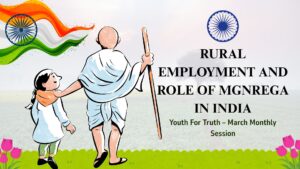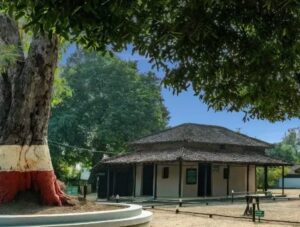By J. B. Kripalani
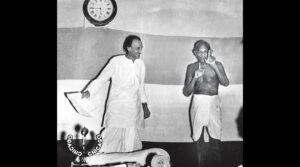
He believed in God but for him God was the moral law, dharma. He therefore considered that all those who believed in the moral law were spiritual even though they were so-called atheists. He says that “Truth is God”. “To me God is Truth and Love; God is ethics and morality; God is fearlessness. God is the source of Light and Life and yet He is above and beyond all these.”
Again he says: “There can be no manner of doubt that this universe of sentient beings is governed by a Law. If you can think of Law without its Giver, I would say that the Law is the Lawgiver, that is God. When we pray to the Law, we simply yearn after knowing the Law and obeying it. We become what we yearn after.” He uttered Rama nama though he made it clear that Rama of his conception was not the husband of Sita or the son of Dasharatha but he who abides in the hearts of men, the Antaryami. However, like the prophets of old, he did not confuse the minds of the ordinary man and woman to whom Rama and Krishna are the Supreme Beings even though they took upon themselves a human form and worked for the establishment of righteousness, dharma and the destruction of adharma. For himself he believed in a formless and attributeless God. He frankly admits that existence of God cannot be proved by reason though it is not against reason. Even if he could not prove His existence by rational arguments which may not convince, he felt it within himself. He says: “There is an indefinable mysterious Power that pervades everything. I feel it, though I do not see it. It is this unseen Power which makes itself felt and yet defies all proof, because it is so unlike all that I perceive through my senses. It transcends the senses. But it is possible to reason out the existence of God to a limited extent.
“I do dimly perceive that whilst everything around me is everchanging, ever-dying, there is underlying all that change a Living Power that is changeless, that holds all together, that creates, dissolves, and recreates. That informing Power or Spirit is God. And since nothing else I see merely through the senses can or will persist, He alone is.
“And is this Power benevolent or malevolent ? I see it as purely benevolent. For I can see that in the midst of death life persists, in the midst of untruth truth persists, in the midst of darkness light persists. Hence I gather that God is Life, Truth, Light. He is Love, He is the Supreme God,”
The great saints and sages of all ages and climes have believed in God and their unbiased evidence kept before us through their life and work must, he held, be conclusive.
Believing in God, Gandhiji had great faith in prayer. Morning and evening there were prayers in the Ashram. When he was on tour, the evening prayers were performed in public before ever increasing congregations. In this prayer no image or symbol was kept. He did not believe in image worship for himself but he had no objection to it for those who needed such symbols. He says: “I do not disbelieve in idol worship. An idol does not excite any feeling of veneration in me. But I think that idol worship is part of human nature. We hanker after symbolism. I do not forbid the use of images in prayer, I only prefer the worship of the Formless. This preference is perhaps improper. One thing suits one man; another thing will suit another man, and no comparison can fairly be made between the two.” His prayers were not petitions. They were in praise of God and they were the yearnings of the soul. They also were meant to strengthen man and keep him away from earthly temptations. He says: “The prayer has saved my life. Without it, I should have been a lunatic long ago. I had my share of the bitterest public and private experiences. They threw me in temporary despair. If I was able to get rid of that despair, it was because of prayer. It has not been a part of my life as truth has been. It came out of sheer necessity, as I found myself in a plight where I could not possibly be happy without it. And as time went on, my faith in God increased, and more irresistible became the yearning for prayer. Life seemed to be dull and vacant without it. I had attended the Christian service in South Africa, but it had failed to grip me. I could not join them in it. They supplicated God, I could not; I failed egregiously. I started with disbelief in God and prayer, and until at a late stage in life I did not feel anything like a void in life. But at that stage, I felt that as food is indispensable for the body, so was prayer indispensable for the soul. In fact, food for the body is not so necessary as prayer for the soul. For starvation is often necessary to keep the body in health, but there is no such thing as prayer starvation. You cannot possibly have a surfeit of prayer. Three of the greatest teachers of the world Buddha, Jesus and Muhammad have left unimpeachable testimony, that they found illumination through prayer and could not possibly live without it. Millions of Hindus, Mussulmans and Christians find their only solace in life in prayer. Either you call them liars or self-deluded people. I will say that this ‘lying’ has a charm for me, a truth-seeker, if it is ‘lying’ that has given me that mainstay or staff of life without which I could not live for a moment. In spite of despair staring me in the face on the political horizon, I have never lost my peace. In fact, I have found people who envy my peace. That peace comes from prayer. I am not a man of learning, but I humbly claim to be a man of prayer. I am indifferent as to the form. Everyone is a law unto himself in that respect. But there are some well-marked roads, and it is safe to walk along the beaten tracks, trodden by the ancient teachers. I have given my personal testimony. Let everyone try and find that as a result of daily prayer he adds something new to his life.”
Never in his prayer-meetings was any patriotic song sung. Good and desirable as love of one’s country may be, it was not the love of God. His prayer-meetings were also occasions for him to take the public into confidence about what was happening in the councils of the great, whether in the national organisation or in the Government. He took them into confidence to the extent that was permissible and desirable. He did this because he wanted from the people enlightened co-operation in the national struggle which was not only meant to remove the foreign yoke but was also meant for their political, economic, social and, above all, their moral advancement. He often said that to the extent India was reformed, it would be free. A reformed India would be a free India.
Gandhiji believed in self-discipline. He felt that his own personal progress and all that he had been able to achieve was because he lived a life of discipline. He held with the Gita, “To him who is temperate in eating and recreation, in his effort for work, and in his sleep and wakefulness, Yoga becomes the destroyer of his misery.”
He believed in occasional fasting. He thought it helped in the concentration of mind. Apart from this he held that fasting had purificatory effect. Sometimes he fasted for the moral lapses of those who lived or worked with him, because he considered himself responsible for their conduct. Any misbehaviour on their part was a proof of some imperfection in him. As he became purer his surroundings would, he thought, adequately respond to the change.
He believed in taking and keeping vows. He thought that their proper observance strengthened the will. However, there is the danger, the present writer feels, that vows taken and broken repeatedly weaken the will and its power of resistance to evil.
We have said that Gandhiji’s life was well-regulated. Buthe was not a flesh-mortifying ascetic. Believing in the philosophy of karmayoga, right action, he could not afford to impair his health by the mortification of the flesh as is done by some ascetics. The restrictions in diet that he placed upon himself were due to circumstances. His vow not to take more than five varieties of food a day was taken because wherever he went, generous and hospitable hosts served him various rich and luxurious dishes. That his kind hosts may not put themselves to extra trouble on his account and to avoid waste in a poor country like India, and not for ascetic reasons, he put the above restriction on himself. He also felt that increasing one’s wants beyond a particular limit, instead of benefiting an individual, became a burden on him.
Gandhiji had a good appetite and whatever food he took at the time was healthy and pure. He took time to eat the food and seemed to enjoy it. If a person fell ill in the Ashram, everything prescribed for him by the doctor was made available, whatever the cost. He discarded his shirt and cap and satisfied himself with a loin cloth. This was due to the fact that India in those days did not produce enough cloth, especially hand-spun and hand-woven, to satisfy the minimum needs of the people. Also, this loin cloth was meant to be his identification with the poor. Other restrictions of this nature were imposed because he wanted his entire life to be devoted to the service of humanity. It is a fact that not only public workers fighting for a cause, but all original thinkers and serious workers in any field of life’s activity must and do limit their physical wants.
Only in a Philistine age, which needs constant excitement and believes in the multiplication of physical wants as a mark of culture, will Gandhiji’s life of simple living and high thinking be considered ascetic.
